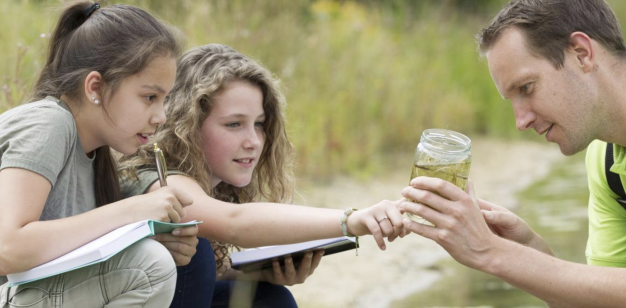
Rethinking education to spur student motivation – and fun
In a part of Sweden northeast of Stockholm, Nina Berglund likes trying out new ways to teach her science students aged 10 to 12.
Berglund recently invited a physics professor named Staffan Yngve to her class in the municipality of Norrtälje. Yngve brought with him a nail mat on which he proceeded to lie down to demonstrate the forces at work, delighting the students.
Memorable moments
‘Even four months after, my pupils still remember it and speak about the visit using scientific terminology,’ said Berglund. She is a proponent of ‘open schooling’, an idea that science teaching must go beyond the staples of school labs such as test tubes, Bunsen burners and the periodic table to get students interested.
Amid concerns that Europe is attracting too few people – especially women – into scientific fields, the aim is to bring science to life for pupils.
While it has no formal defining characteristics, open schooling tends to feature activities such as on-site visits, off-site trips and remote learning that are generally exceptions in standard schools.
‘The big idea is to overcome the barriers we see with science education,’ said Maya Halevy, director of the Bloomfield Science Museum in Jerusalem, Israel.
Halevy led a research project that received EU funding to advance the whole concept. Called Make it Open, or MiO, the project ended in September 2023 after three years.
It helped to establish open schooling ‘hubs’ in 10 European countries ranging from Sweden to Greece, bringing together more than 150 schools.
MiO’s online “navigator” gives teachers access to new resources and lessons.
For example, at a Spanish educational institution called IES de Ortigueira in the northwestern part of the country, 12-year-olds learnt about physics by designing and building model playgrounds. The models were then displayed in the library, where the students explained their work to visitors.
The pupils also conducted a study on air pollution in Spain using core maths skills. The exercise featured press articles about contamination and a debate about the impact on human health.
Opening minds
‘I was able to observe how the students learnt without realising,’ said science teacher Patricia Hermida Galán. ‘They had fun while working and learning.’
MiO bolstered school recruitment and communications by teaming up with a network of European education ministers known as the European Schoolnet and with a Europe-wide alliance called Ecsite that brings together more than 300 organisations including museums to promote science engagement in society.
Greta Alliaj, who coordinated work on behalf of Ecsite, said the Covid-19 pandemic that struck in 2020 and turned in-person lessons into online sessions for millions of young people gave momentum to the idea of open schooling,
‘We saw how many schools and teachers wanted new ideas and space to innovate and experiment with lessons,’ said Alliaj. ‘This open approach to learning is increasing scientific literacy among pupils and encouraging pupils to opt for scientific careers.’
While the components of a new school system are being put in place by projects such as MiO, broader momentum will require national, regional and local educational authorities to throw their weight behind the whole idea.
According to Halevy, what’s still missing is a ‘glue’ to connect all the various players – schools, communities, museums, extracurricular centres and even workplaces – with one another. She said that’ll require a coordinated international effort over years.
Real-world lessons
Pavlos Koulouris is another on-the-ground force for educational change in Europe.
Based in Athens, Greece, he is a faculty member at a school called Ellinogermaniki Agogi, which means “Hellenic-German Education” and takes its name from an emphasis in the curriculum on learning German as a foreign language.
Koulouris coordinated an MiO sister project called ‘Schools as Living Labs’ , or SALL, which wrapped in August 2023 after three years.
SALL worked with more than 400 schools in 10 countries: Cyprus, Croatia, Estonia, Greece, Israel, the Netherlands, France, Portugal, Serbia and Spain. The aim was to give open schooling stronger roots by putting teachers and pupils in touch with their wider communities. “Living labs” acted as meeting points.
‘It’s all about opening up the school to society,’ Koulouris said. ‘With open schooling, science is made relevant across our lives.’
Unconventional thinking
At the primary school of Makrygialos near Greece’s second-biggest city, Thessaloniki, teacher Thanos Batsilas and his students were part of a living lab that taught environmental science through an activity involving mussel farming.
They accompanied farmers on a boat out to sea to observe how the environment is inextricably linked to the wellbeing of area residents and how climate change is advancing. The underlying point was that mussel farming is a viable way to make a living and can help support the local ecosystem.
‘Children loved the living-lab activities because they love anything that is out of the box,’ Batsilas said. ‘They embrace it.’ Koulouris said open schooling has the potential to turn traditional notions of academic achievement on their head.
He said evidence from the schools that SALL worked with suggest that open schooling is improving students’ self-esteem, involvement in science and civic engagement.
Koulouris hopes SALL will act as a springboard for more broad-based educational changes in Europe, saying they’re needed because of a range of global threats that scientific knowledge can help address.
‘The world is facing huge, complex challenges,’ he said. ‘These require everyone’s involvement, everyone’s awareness, everyone’s efforts. We hope open schooling can make science relevant in this way.’
Watch the video
This article was originally published in Horizon, the EU Research and Innovation magazine, and republished with their permission under Creative Commons Licensing guidelines.




